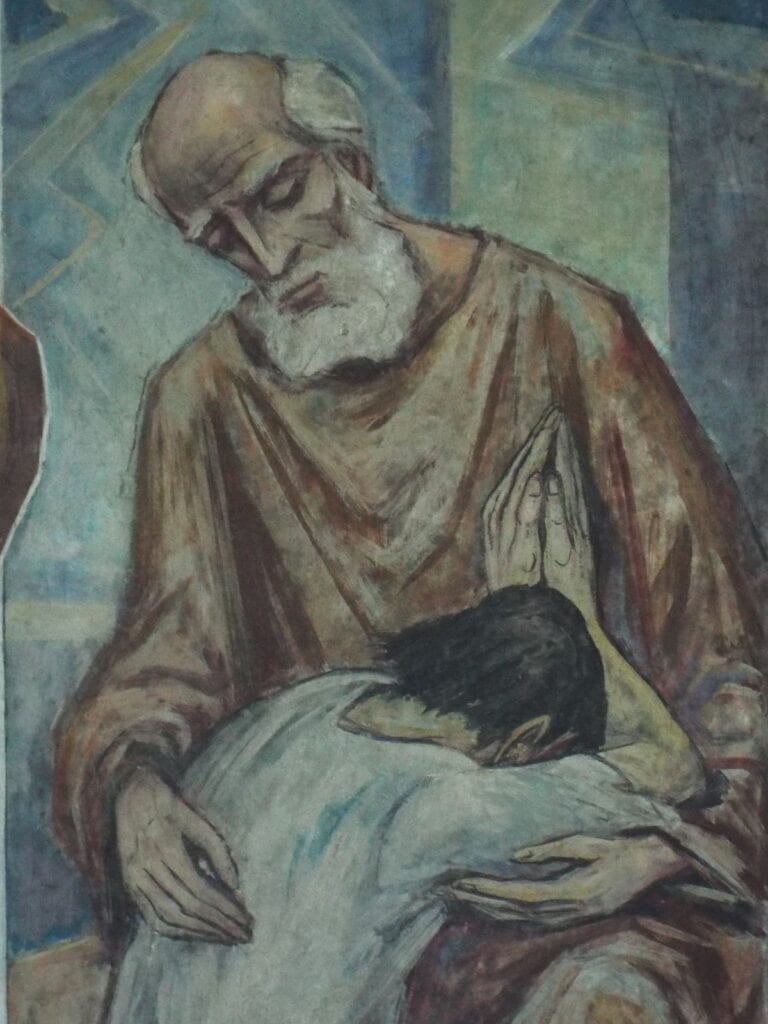“God, who is rich in mercy, out of the great love with which he loved us, even when we were dead through our sins, made us alive together with Christ.” – Ephesians 2:4-5
Let us consider the implications for the missionary of a God who is “rich in mercy.” And for this, we naturally turn to the missionary “par excellence” — Saint Paul. It’s an understatement to say that Christians everywhere owe a debt of gratitude to St. Paul. As the theologian Rev. Raymond Brown, S.S. said, Paul was the man who did more than anyone else in his time to lead people to see what Jesus Christ meant for the world.
Let us look at this remarkable missionary and the insights about God that motivated him. The Acts of the Apostles and Paul’s own epistles paint a vivid portrait of a man who endured many hardships to proclaim the good news of Jesus Christ to the Gentiles. In 2 Corinthians 11:23-29, he writes of being near death on numerous occasions, and of being in almost constant danger during his travels. He often went without sleep and nourishment. He was beaten and stoned. He was denounced by Jews and Gentiles alike. He felt constant anxiety about the churches he had established.
Why did Paul subject himself to all this “grief?” Before his conversion, Paul had been at peace with his upbringing, with himself, and with his God. He was an educated Jew, well versed in his religious tradition. What happened that would bring about such a drastic change in him that he would risk everything to preach the gospel?
In Acts 9:3-8, we have the dramatic story of his conversion on the road to Damascus, in which God revealed His Son, Jesus Christ, to him. This revelation enabled Paul to proclaim in his letter to the Philippians, “I count everything as loss because of the surpassing worth of knowing Christ Jesus my Lord” (Phil 3:8). But would that have been enough to lead to the insight into what Christ meant for the Gentiles? Or, perhaps, did something far more significant happen to Paul on a personal level?
As a good and faithful Jew, Paul would have already known the love shown by the God of his Israelite ancestors. But somehow in the revelation he received on the road to Damascus, Paul discovered a love that went beyond his previous imagination. In Philippians 3:12, he admits feeling “taken over” by Christ Jesus. With awe, he exclaims in Galatians 2:20 that, “The Son of God loved me and gave himself for me.” In Romans 8:35-37, he asks: “Who will separate us from the love of Christ?” And, again, in 2 Corinthians 5:14, he writes: “The love of Christ impels us once we come to the conviction that one died for all.” Christ’s love, then, became the motivating force of Paul’s life.
From his insight about the love of Christ, Paul takes the bold step of initiating the mission to the Gentiles. The hardships encountered in the mission became for Paul more than means to be endured toward an end. If the love of God was manifested in the self-giving of Christ, how could the love of Christ be shown to others except in the same way?
The question Paul asked two thousand years ago is no less relevant today. As men and women who have dedicated ourselves to serving God’s people in the context of the Vincentian charism, we have a particular vocation to show the mercy and love of God to the poor and abandoned, to those who are not experiencing that love and mercy because of their life situations, to give ourselves completely in loving service to others.
I would like to share with you a few lines from the Peruvian theologian Rev. Gustavo Gutierrez, O.P. In his book, “We Drink From our Own Wells: The Spirituality of a People,” he writes: “Commitment to the poor means entering, and in some cases remaining in, [their] universe with a much clearer awareness; it means being one of its inhabitants, looking upon it as a place of residence and not simply of work. It does not mean going into that world by the hour to bear witness to the gospel, but rather emerging from within it each morning in order to proclaim the good news to every human being.”
Not all of us have the opportunity at this moment in our lives to live among the poor. Still, as followers of St. Vincent de Paul, we have thrown in our lot with the poor, the lonely, the forgotten, the hurting people of this world. Wherever we find ourselves in the providence of our daily lives — whether we are actively working on the missions or in a ministry of prayer — whether we are caring for our family or running a business — we are challenged daily to find deep within ourselves the same motivation we find in St. Paul.
And how do we do that? Like Paul, we must accept ourselves as unconditionally loved by God. But the example of St. Paul also tells us that once we experience and accept the unconditional love of God, we must act. Our insight must lead us to take a “bold step.” For us, called to live our lives in the spirit of St. Vincent, perhaps that step is as simple as this: wherever we are, whatever we are called to be doing, we allow our lives to bear witness to the good news of God’s love and mercy.
When have you discovered the love of God that went beyond your previous imagination? What “bold step” might God be asking you to take next?
Pat Regan, MCA






0 Comments